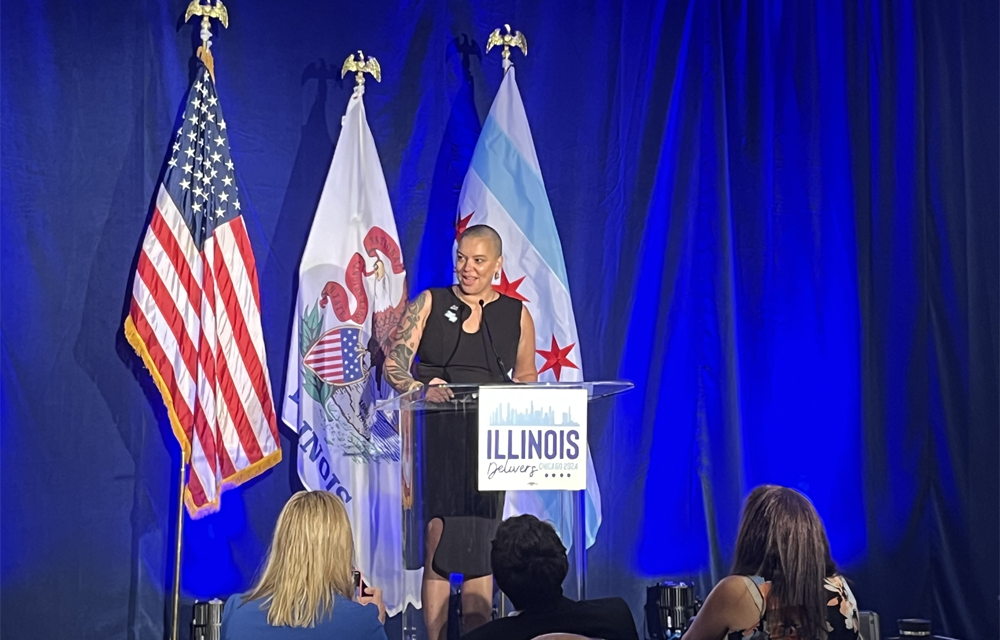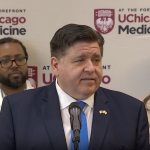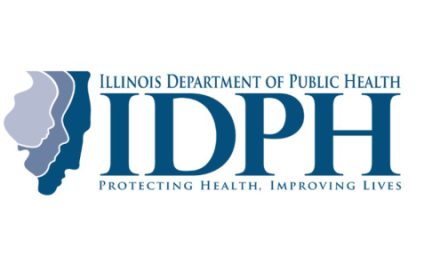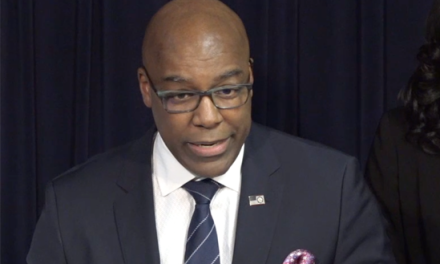
Personal PAC, Chicago Abortion Fund discuss increased focus on abortion at DNC

Abortion and reproductive healthcare took center stage at this week’s Democratic National Convention in Chicago.
The issue was at the top of mind for Vice President Kamala Harris as well as Illinois lawmakers and stakeholders who spoke during the four-day event.
“I never thought in my lifetime that I would ever hear on a national platform abortion talked about so openly and to be treated like what it is, which is life-affirming, essential healthcare,” Sarah Garza Resnick, CEO of the Chicago-based Personal PAC, told Health News Illinois this week.
Those like Lt. Gov. Juliana Stratton highlighted steps Illinois has taken related to the issue, from codifying the right to an abortion before the Supreme Court overturned it on a federal level to protecting access to abortion medication and in vitro fertilization.
Gov. JB Pritzker’s Think Big America nonprofit group held a panel discussion on Wednesday that focused on national work to support and expand abortion rights.
The attention to abortion has drawn the ire of groups like Illinois Right to Life. They said earlier this week that the “Democratic party, particularly in Illinois, is more anti-life than it has ever been before.”
Health News Illinois caught up with Resnick and Chicago Abortion Fund Executive Director Megan Jeyifo to discuss the convention’s focus on abortion, the current state of reproductive healthcare in Illinois and the impact if either Vice President Kamala Harris or former President Donald Trump wins in November.
Edited excerpts below:
HNI: How is the mood this week at the convention as it relates to reproductive healthcare?
Sarah Garza Resnick: To be honest, I never thought in my lifetime that I would ever hear on a national platform abortion talked about so openly and to be treated like what it is, which is life-affirming, essential healthcare. So I’m just buzzing with excitement.
I think everyone’s really pumped and stoked about where we are. Frankly, my perspective and what I focus on is talking to other advocates on the ground in other states, because I want to share — and I am sharing — how we did it. ‘Here’s the blueprint for how Personal PAC did this, and how can we help you be successful?’ Because the ballot initiatives are wonderful. All of this stuff is great. If you don’t have a very dedicated small group of people on the ground afterward, then you won’t really have equitable access to abortion.
Megan Jeyifo: It’s certainly different than it was a few weeks ago. I think it is a very welcome change to have someone at the top of the ticket who says the word abortion unequivocally, who is leading with abortion access as the important issue that we all know that it is and who recognizes that and names it. And I think even just the idea that we’re not using euphemisms anymore — we’re not only saying reproductive healthcare or only saying women’s rights or only saying choice, we’re actually full-throatedly saying abortion — that goes a long way for people who have had abortions and people who need access to abortion to know that that is important to the presidential nominee for the Democratic Party.
HNI: What’s the current state of abortion and reproductive healthcare in Illinois?
Sarah Garza Resnick: It’s very strong. We are both playing offense, which you saw when we did all of the prep work before Roe even fell. We read the tea leaves and saw what was going to happen. And we’re also playing defense because the other side is evolving and changing their strategies. As they’re losing at the ballot boxes, they’re going to try and challenge people in other ways. So, for example, we have passed the Patient (and) Provider Protection Act, which shields patients and providers from any legal action that could come from other states for lawful healthcare performed here. This year, we helped pass the now-law to help decrease the instances of maternal mortality. So now abortion care is considered in the continuum of all reproductive healthcare, and there is going to be no cost-sharing — so no copays, no high deductibles being met for abortion care along with other maternal healthcare.
HNI: How are you holding up to demand for service?
Megan Jeyifo: As much as we are fundraising for presidential campaigns, for campaigns up and down the ticket or ballot initiatives … I want much more than Roe to be restored. I don’t like the calls to restore Roe, I think it is not nearly enough. But while we are waiting for some kind of federal intervention, we have to make sure that we’re resourcing abortion funds like us, so that people can continue to get healthcare for the years and potentially decades that this is going to take to fix. And so as much as we are happy that abortion is being named, we need abortion funds and our work to be resourced so that people are not winning elections on the backs of people forced to remain pregnant when they didn’t want to be …
We are really excited that the DNC is being held here because we want to celebrate Chicago, and we want to celebrate Illinois for the investments that they have made in not just passing laws to Patient (and) Provider Protection Act to make sure abortion is legal, but resourcing abortion funds to make sure it’s accessible. We’ve received investment from both the city and the state, and that is very unique, and it’s really, truly important. So the more we see that replicated around the country — there are other states that could use what Illinois is doing as a model — the more people around this country will be able to access their abortions without barriers or fears of criminalization or stigmatization.
HNI: What’s the balance between supporting abortion ballot initiatives in states while also making sure that providers and groups like the Chicago Abortion Fund are able to do their work?
Sarah Garza Resnick: I work with the Chicago Abortion Fund every single day. I work with all the independent providers all over the state. It’s an ‘and’ situation — it’s not an ‘or.’ We have to harness the moment that we’re in to push abortion rights as far as we can. And that means winning at the state level in other states. And it also means that a place like Illinois must, while all this other work is being done electorally and legislatively, that we are doing the work to remain the safe haven that is required to actually provide equitable abortion access … The city gives funding. We’re working on the county. And it is philanthropic donors. If you say this is your issue, and you are pro-choice, you have to donate to all of us right now. And that is just the fact of it. What the Chicago Abortion Fund does is really important, but the Chicago Abortion Fund can’t do their work unless I have the political dollars to do the work that we need to do and have done in Illinois.
HNI: What impact do you expect this November’s election will have, whether it be a Harris presidency or a second Trump presidency?
Megan Jeyifo: We have real fears about what a national abortion ban would mean for our work. We have real fears about the protections we have to do our work. I think those are top of mind. We saw what happened in four years. We can only imagine what happens in four more, especially by someone who is emboldened and who doesn’t play by the rules. The right has never really played by the rules when it comes to this issue. They’ve been very creative in their bans and kind of throw anything at the wall to see what sticks. I would like for us to do the same and to try to be creative and nimble to match policy for policy and increase access.
Sarah Garza Resnick: Let’s be very clear: A second Trump administration will kill women. Period. They want a national abortion ban. It is in the Project 2025 plan. They have said it. But it’s not only about abortion. They want to attack our birth control. They want to attack who we’re allowed to sleep with. They want to attack access to in vitro fertilization. They want control over our bodies. Under a Harris and (Minnesota Gov. Tim) Walz administration, we are going to have two leaders who understand that we should do exactly what Illinois has done. We need to trust women. There is no point where a politician knows more about what’s happening in my body than me and my doctor. No politician on this planet, no matter how good they are, will ever get there.









